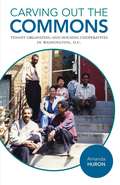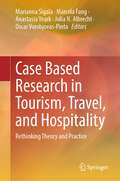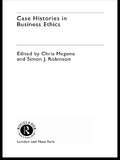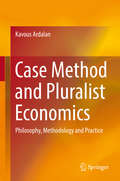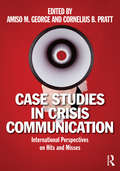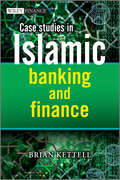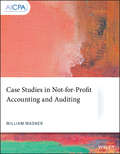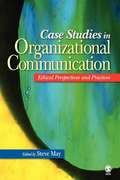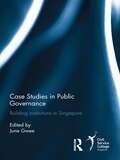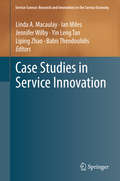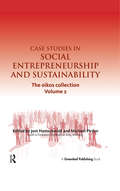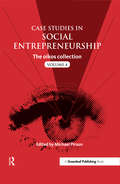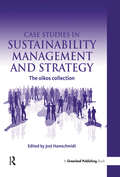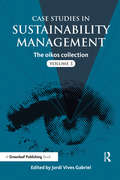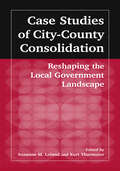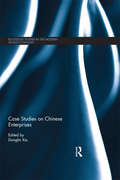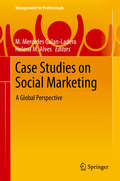- Table View
- List View
Carving Out the Commons: Tenant Organizing and Housing Cooperatives in Washington, D.C. (Diverse Economies and Livable Worlds #2)
by Amanda HuronAn investigation of the practice of &“commoning&” in urban housing and its necessity for challenging economic injustice in our rapidly gentrifying cities Provoked by mass evictions and the onset of gentrification in the 1970s, tenants in Washington, D.C., began forming cooperative organizations to collectively purchase and manage their apartment buildings. These tenants were creating a commons, taking a resource—housing—that had been used to extract profit from them and reshaping it as a resource that was collectively owned by them. In Carving Out the Commons, Amanda Huron theorizes the practice of urban &“commoning&” through a close investigation of the city&’s limited-equity housing cooperatives. Drawing on feminist and anticapitalist perspectives, Huron asks whether a commons can work in a city where land and other resources are scarce and how strangers who may not share a past or future come together to create and maintain commonly held spaces in the midst of capitalism. Arguing against the romanticization of the commons, she instead positions the urban commons as a pragmatic practice. Through the practice of commoning, she contends, we can learn to build communities to challenge capitalism&’s totalizing claims over life.
Cascading: The Process
by Robert S. Kaplan David P. NortonCorporations follow different paths to achieve enterprise-wide alignment. An organization can cascade the Balanced Scorecard and Strategy Map management system top-down or bottom-up, but ultimately scorecard reporting, analysis, and decision making should be flowing in both directions. This chapter focuses on organizations that start at the corporate level and then cascade sequentially down the organizational hierarchy, providing examples of successful adopters.
Case Based Research in Tourism, Travel, Hospitality and Events
by Karen A. Smith Marianna Sigala Anastasia Yeark Rajka Presbury Marcela FangThis book consolidates international, contemporary and topical case study based research in tourism, travel, hospitality and events. Case studies can make learning more attractive and interesting as well as enable students to understand the theory better and develop their analytical and problem-solving skills. Using industry as an open living lab, case study based research infuses scholars into real-world industry challenges and inspires them to theorise and advance our knowledge frontiers.The book includes international case studies that can help tourism scholars build and advance (new) theories and enrich their educational practices. Case studies are accompanied with a teaching note guiding scholars to integrate case studies into instruction.Dr Kirsten Holmes, Chair, Council for Australasian Tourism and Hospitality Education (CAUTHE) There is a vital need for contemporary and well-structured case studies for use in tourism teaching. By including case studies from Australasia and key destination regions in Asia, Europe, and the Caribbean, the book is helpful for tertiary teachers globally. Professor Xander Lub, President, EuroCHRIE The book inspires educators and students. The cases provide context to students’ learning and demonstrate the richness and variation of the industry. The book also clearly demonstrates how research can inform our teaching. Professor Brian King, Chair, THE-ICE Assessment Panel The book includes cases under five themes: experiences, operations, technologies, strategy and marketing, and destinations. The book provides subject lecturers with a structure to guide students of applying theory into practice. Dr Paul Whitelaw, Academic Director, Southern Cross UniversityThis book marks a significant contribution to hospitality, tourism and events pedagogy at undergraduate and postgraduate level. At a time when the industry is demanding that our graduates have a strong grasp of “real world issues”, the case study approach provides an accessible, meaningful and relatable means by which students can engage in real world issues.
Case Based Research in Tourism, Travel, and Hospitality: Rethinking Theory and Practice
by Julia N. Albrecht Marianna Sigala Anastasia Yeark Marcela Fang Oscar Vorobjovas-PintaThis book consolidates case study based research in tourism, travel, hospitality, and events under one roof. It aims to consolidate cutting edge case study based research within the wider tourism industry that investigates topical and contemporary industry challenges and practices, which in turn can help tourism scholars to build new theory for advancing tourism research and educational practices. Case study based research is well recognised for its ability to develop theories and to support pedagogical aims. This book explores the repercussions of COVID-19 on tourism in how this has magnified the need and the urgency to use case based research and teaching. COVID-19 has accelerated profound changes in the tourism industry that are demonstrated in transformed: consumer profiles and behaviours; industry structures, business models and operations; and tourism labour markets. Subsequently, tourism educators, providers and researchers are required to study andaddress the abovementioned changes by undertaking transformational tourism research that can challenge and shift existing theories and knowledge frontiers, help industry and academia alike to reset new industry standards; and 2) develop tourism graduates that meet the new industry requirements, are resilient, flexible and adaptable, they possess transferable knowledge and skills that can solve real industry problems. The aim of this book to meets the market gap of books focusing on case study based research and teaching and further expands to address the COVID-19 repercussions and opportunities for tourism research and case studies.
Case Flash Forward: 3M Optical Systems (1999)
by Baker LibraryEach Case Flash Forward provides educators and students with a brief, 2-page update of key changes at a particular company covered in a related case study. It is a compilation of publicly-available content prepared by an experienced editor. This Case Flash Forward provides an update on 3M, including significant developments, current executives, key readings, and basic financials.
Case Histories in Business Ethics
by Simon J. Robinson Chris MegoneCase Histories in Business Ethics illustrates and extends the role of case histories in the teaching and study of business ethics. Typically, case histories are used to illustrate assertions or arguments, or to stimulate debate about an issue within business ethics. This volume examines that role, illustrating the link between case histories and mo
Case Method and Pluralist Economics: Philosophy, Methodology and Practice
by Kavous ArdalanThis book discusses the relationship between pluralist economics and the case study method of teaching, advocating the complimentary use of both to advance economics education. Using a multi-paradigmatic philosophical frame of analysis, the book discusses the philosophical, methodological, and practical aspects of the case study method while drawing comparisons with those of the more commonly used lecture method. The book also discusses pluralist economics through the exposition of the philosophical foundations of the extant economics schools of thought, which is the focal point of the attention and admiration of pluralist economics. More specifically, the book discusses the major extant schools of thought in economics - Neo-Classical Economics, New Institutional Economics, Behavioral Economics, Austrian Economics, Post-Keynesian Economics, Institutional Economics, Radical Economics, and Marxist Economics--and emphasizes that these schools of thought in economics are equally scientific and informative, that they look at economic phenomena from their certain paradigmatic viewpoint, and that, together, they provide a more balanced understanding of the economic phenomenon under consideration. Emphasizing paradigmatic diversity as the cornerstone of both the case method and pluralist economics, the book draws the two together and makes an effective case for their combined use. A rigorous, multi-faceted analysis of the philosophy, methodology, and practice of economics education, this book is important for academicians and students interested in heterodox economics, philosophy, and education.
Case Research in Public Management
by David E McNabbHighly readable and non-technical, this handbook is designed to help students and non-profit managers gain a working knowledge of the principles and practices of conducting qualitative case study research in public organizations. This book is a motherload of practical and comprehensive guidance to planning, conducting, analyzing, and reporting case research project findings. McNabb begins with a detailed rationale for the use of the case research approach in public administration, non-profit organizations, and political science. Then it provides step-by-step instructions on how to conduct single-case, multicase, and meta-analysis research, with guidelines on organizing and writing the case report. Case Research in Public Management also includes many examples of case studies in a wide range of important topics in public administration, including performance management, sustainable government, technology management, security issues, emergency and disaster management, social and health services, infrastructure, public transportation, and transforming the work of government.
Case Studies In Courageous Organizational Communication: Research And Practice For Effective Workplaces
by Alexander LyonAlexander Lyon presents 31 case studies in organizational communication that explore issues of courageous communication. Through case studies on many well-known organizations such as Google, the Miami Dolphins, NASA, Comcast, the Boy Scouts of America, Netflix, Taco Bell, Massachusetts General Hospital, Merck Pharmaceuticals, and others, the book articulates a communication-based model of courage around four themes: Courageous communication is collaborative, upward, transparent, and engaging. The book presents both effective and cautionary portraits of organizations as they responded to complex issues. It situates the case studies in existing literature and provides practical guidance for enacting courageous communication in professional settings.
Case Studies in Crisis Communication: International Perspectives on Hits and Misses
by Amiso M. George Cornelius B. PrattCase Studies in Crisis Communication: International Perspectives on Hits and Misses was created to fill the gap for a much-needed textbook in case studies in crisis communication from international perspectives. The events of September 11, 2001, other major world crises, and the ongoing macroeconomic challenges of financial institutions, justify the need for this book. While existing textbooks on the subject focus on U.S. corporate cases, they may not appeal equally to students and practitioners in other countries, hence the need to analyze cases from the United States and from other world regions. The variety and the international focus of the cases, be they environmental, health or management successes or failures, makes this book more appealing to a wider audience. These cases examine socio-cultural issues associated with responding to a variety of crises.
Case Studies in Islamic Banking and Finance
by Brian KettellCase Studies in Islamic Banking and Finance is a pioneering resource that provides practical insights into the real world of Islamic financial transactions, and illustrates the complexities of this rapidly growing mode of modern finance.Based around 12 individual cases, the book stimulates discussion and develops the reader's understanding of Islamic finance by contrasting the theoretical concepts discussed in the author's companion text Introduction to Islamic Banking and Finance with practical real world situations. The cases cover core Islamic banking and finance topics including the Ijara, Mudaraba and Musharaka contracts; Islamic mortgages for home finance; leverage; and issues involved in opening an Islamic bank. Financial statement analysis for Islamic banks, the implications for fund management for equity investing and the impact of loan defaults on Islamic and conventional banks are also included. Each chapter concludes with a set of questions designed to test the reader's understanding of each case, with suggested solutions at the end of the book.This book is a must have resource for those wishing to apply their understanding of this complex subject and is an essential read for anyone seeking practical examples of how to apply the concepts in a real world environment.
Case Studies in Not-for-Profit Accounting and Auditing
by William WagnerCase Studies in Not-for-Profit Accounting and Auditing by William Wagner
Case Studies in Organizational Communication: Ethical Perspectives and Practices
by Steve MayThis book is designed to integrate ethical theory and practice in order to strengthen students' ethical awareness, judgement, and action in organizations by exploring ethical dilemmas in a diverse range of cases.
Case Studies in Public Governance: Building Institutions in Singapore
by June GweeThis book makes available original case studies on how institutions developed in Singapore. Up until now, these case studies have been used exclusively in Singapore to teach public governance, and have been well-received in the Singapore Civil Service College’s milestone programmes. With this publication, more will be able to access this material. Students, researchers and policy-makers can now use these case studies for pedagogy or to derive insights on Singapore’s approach on governance. Designed around the theme of "building institutions", the case studies also present facets of how institutions developed which are universal to management studies. These case studies highlight a core aspect in the development of institutions, namely, how people and organisations change the culture of institutions, how leaders influence their organisations, and how policies define the systems that build institutions. The book contains 5 case studies, each profiling a unique sector and key institution in Singapore. They present how public agencies and leaders helped to build Singapore institutions over the last forty years. Although there are more cases studies on management and strategy than public policy and administration, there is growing interest in Asian case studies, and more specifically, case studies on Singapore public governance. This collection of case studies on Singapore institutions provides the perspective from Singaporean case writers themselves, on the role of government in Singapore’s development.
Case Studies in Service Innovation: Measurement And Case Study Analysis (Service Science: Research and Innovations in the Service Economy #18)
by Ian Miles Yin Leng Tan Babis Theodoulidis Liping Zhao Jennifer Wilby Linda A. MacaulayCase Studies in Service Innovation provides the reader fresh insight into how innovation occurs in practice, and stimulates learning from one context to another. The volume brings together contributions from researchers and practitioners in a celebration of achievements with the intention of adding to the wider understanding of how service innovation develops. Each case presents a brief description of the context in which the innovation occurred, the opportunity that led to the innovation and an overview of the innovation itself, also addressing how success was measured, what success has been achieved to date and providing links to further information. The book is organized around five major themes, each reflecting recognized sources of service innovation: Business Model Innovation: new ways of creating, delivering or capturing economic, social, environmental and other types of value; The Organization in its Environment: an organization engaging beyond its own boundaries, with public private partnerships, sourcing knowledge externally, innovation networks, and open or distributed innovation; Innovation Management within an Organization: an organization actively encouraging innovation within its own boundaries using project teams, internal governance of innovation, and methods or tools that stimulate innovation; Process Innovation: changes in service design and delivery processes, such as consumer led innovation or consumers as part of the innovation process, service operations management, and educational processes; Technology Innovation: the use of technology, including ICT enabled innovation, ICTs that are themselves innovative and support the delivery of new services, new ICT services, new ways of delivering services associated with ICT products, and technology other than ICT. The final part of the book is given to four extended cases allowing for a more in-depth treatment of innovation within a complex service system. The extended cases also illustrate two important and growing trends, firstly the need for, and benefits of, a more customer centric approach to service innovation and secondly the need for better understanding of public services and the role of public-private partnerships in identifying and achieving innovation.
Case Studies in Social Entrepreneurship and Sustainability: The oikos collection Vol. 2
by Michael Pirson Jost Hamschmidt Marina KimIn 2008, Ashoka launched the "Changemaker Campus Initiative" which applies Ashoka's rigorous criteria to select and support universities as they develop and implement a comprehensive social entrepreneurship plan. Through the lessons learned from this network, and with input from its broader global network of those experienced in the field, Ashoka aims to set a new standard for social entrepreneurship education. Indeed, despite the rising demand, there remains a dire need for quality coursework and global teaching case studies. Social entrepreneurs – and the pressing challenges they solve – are not bound by geographic borders or a single political environment, yet there is a lack of the materials necessary to equip students with the skills and mind-set required to catalyze systemic social change. What few high-quality case studies do exist typically highlight social entrepreneurs within the United States. This cooperation with oikos within the Social Entrepreneurship Track of the annual oikos Global Case Competition is a critical vehicle for tackling that challenge. As a result of this effort, more locally relevant case studies are being written, peer-reviewed, and judged than ever before, and are able to make their way into the hands of global audiences eager to adopt them into their courses. Building social entrepreneurship skills and problem-solving abilities are best practiced and honed using real-life examples and strategic challenges – not just learning theories in a vacuum. Case studies provide this exposure and real-time training in systemic problem-solving. Through these 15 teaching cases, students learn that social entrepreneurship is about identifying root causes of problems and applying a solution that tackles the system. As study upon study has shown, the band-aid approach does not work. To effectively address a social problem, the solution must continually adapt and evolve based on market feedback about what works and what needs to change in the model. Case Studies in Social Entrepreneurship and Sustainability is the second volume resulting from the oikos Global Case Writing Competition – an annual program launched in 2003 to promote the publication of high-quality teaching cases in corporate sustainability. This book expands the collection with award-winning global cases in the rapidly growing field of social entrepreneurship and sustainability. In view of the growing importance of various sustainability trends, management schools are increasingly challenged to adapt their entrepreneurship and business curricula. Management education needs to reflect the trends and provide a broadened understanding of value creation. Sustainability is a concept that demands that organizations consider the legitimate expectations of different stakeholders in their value creation processes. At the same time, it underlines the fact that many sustainability trends offer new business opportunities that entrepreneurs will seize. As a result, value creation processes need to be reorganized in order to create economic capital while developing social capital and preserving natural capital. Indeed, entrepreneurial organizations are increasingly dealing with these challenges. The case studies in this book explore both the opportunities and pitfalls entrepreneurs – working with organizations with for-profit, hybrid and non-profit business models – face in targeting sustainability issues and how their values and core assumptions impact their business strategies. They describe new patterns of value creation, new alliances, and the challenges of dealing with existing paradigms. It is clear that new ways of doing business with a common objective of maximizing social impact are substantially shaping markets and society. This textbook of competition-winning case studies for management education in the field of social entrepreneurship and sustainability provides excellent learning opportunities, tells engaging stories, deals with recent situations, includes quotations from key actors, is
Case Studies in Social Entrepreneurship: The oikos collection Vol. 4
by Michael PirsonThis book is an essential resource for the increasing number of facilitators who wish to help students learn about the promise and pitfalls of social enterprise. The oikos-Ashoka case competition for social entrepreneurship was conceived in 2007 as a way to help find great material and case studies in this emerging field. This fourth collection of oikos case studies is based on the winning cases from the 2010 to 2014 annual case competitions. These cases have been highly praised because they provide excellent learning opportunities, tell engaging stories, deal with recent situations, include quotations from key actors, are thought-provoking and controversial, require decision-making and provide clear take-aways. This new volume of social entrepreneurship case studies highlights cases from around the globe authored by teachers from around the globe. The selected cases span many industries and geographic contexts; nevertheless, they are connected by a shared ambition: to highlight the power of entrepreneurship to solve social problems. The cases are clustered in three different sections: Socially oriented Enterprise Cases – Health and Fair trade, Ecologically oriented social enterprises, and Corporate Social Entrepreneurship. Case Studies in Social Entrepreneurship will be an essential purchase for educators and is likely to be a widely used as a course textbook at all levels of management education. Online Teaching Notes to accompany each chapter are available on request with the purchase of the book.
Case Studies in Strategic Planning
by Hakan ButunerCase Studies in Strategic Planning shows you how to do systematic strategic planning in real-life cases, regardless of your level of expertise. The simplified version of this methodology and its analysis tools, based on fundamentals, are easily understood and universally applied to any type of business for developing strategic plans. More important
Case Studies in Suburban Sustainability
by Sandra J. Garren and Robert BrinkmannThe first volume to focus on suburbs and sustainability in the United States, this collection approaches the topic through regionally diverse case studies. Departing from the more widely examined issue of urban sustainability, contributors argue that the suburbs present a unique and important challenge given their greater land mass, lower population density, lower tax rates, and more limited government services. The studies featured in this volume analyze the impact of planning, social and economic concerns, environmental factors such as air pollution and climate change, and water management on suburban communities. Areas of focus include suburbs of New York City, Seattle, Pittsburgh, Los Angeles, Phoenix, New Orleans, and Tampa. In these examples, contributors show that activism and leadership are currently advancing a strong sustainability agenda in regions many would have believed unlikely. Through these case studies, this volume demonstrates that the suburbs are a crucial nexus for sustainability in the United States. Because suburbs have been overlooked in most green initiatives, and because they play such a vital role in the future of American housing and development, these essays call for more research and continued creative innovation in these areas. Contributors: Troy D. Abel | Simon A. Andrew | Viney P. Aneja | Miles Ballogg | William H. Battye | Casey D. Bray | Vaswati Chatterjee | Stacy Clauson | Craig E. Colten | Sarah Combs | Yonn Dierwechter | Richard C. Feiock | Michael H. Finewood | Melissa M. Grigione | John Harner | Mathew K. Huxel | Mike Johnson | Gabrielle R. Lehigh | Elizabeth Mattiuzzi | Sean McGreevey | Susan M. Opp | Michaela C. Peterson | Benjamin L. Ruddell | Richard R. Rushforth | Debra Salazar | Ronald Sarno | Mallory Thomas | Carolina A. Urrea | Pornpan Uttamang | E. Christian Wells
Case Studies in Sustainability Management and Strategy: The oikos collection
by Jost HamschmidtWith the rapidly growing importance of sustainability and corporate responsibility in a globalised world, management schools are increasingly integrating long-term economic, environmental and social issues into their teaching and research. Climate change, poverty, labour standards and human rights are among the many topics that future decision-makers will need to face in their careers. Business education needs to reflect this new reality and provide a broadened understanding of value creation in order to create economic capital while developing social and preserving natural capital. Many sustainability trends also offer interesting new business opportunities that are ripe for entrepreneurial thinking. Case studies can be important tools for creating learning processes on different levels - students are forced to struggle with exactly the kinds of decisions and dilemmas managers confront every day. In this reflection of reality, the values and goals of the student are systematically challenged. This can be especially valuable in the context of sustainability and strategy - organisations are now continually forced to value the different aspects of sustainability and their interrelations: How do social issues impact the economic bottom line? How can an environmentally sound strategy create a positive impact on employee motivation and thus have measurable impact on economic performance? What comes first and why? But excellent case studies for management education in the field of sustainability management and strategy are rare. This innovative collection has been produced to fill this gap. It is based on the winning cases of an annual competition organised by oikos - the international Student Organization for Sustainable Economics and Management. So what makes an excellent case in sustainability management? These cases have been highly praised because they provide excellent learning opportunities, tell engaging stories, deal with recent situations, include quotations from key actors, are thought-provoking and controversial, require decision-making and provide clear take-aways. These cases explore both the opportunities and pitfalls companies and NGOs face in targeting sustainability issues and how their values and core assumptions impact their business strategies. They deal with a myriad of issues including supply chain management, stakeholder dialogue, social entrepreneurship, sustainable marketing, ethics, governance, the business case for sustainability, partnerships, purchasing and climate change. Case Studies in Sustainability Management and Strategy is an essential purchase for educators and is likely to be a widely used as a course textbook at all levels of management education. Online Teaching Notes to accompany each chapter are available on request with the purchase of the book.
Case Studies in Sustainability Management: The oikos collection Vol. 3
by Jordi Vives GabrielWith the rapidly growing importance of sustainability and corporate responsibility in a globalised world, management schools are increasingly integrating long-term economic, environmental and social issues into their teaching and research. Climate change, poverty, labour standards and human rights are among the many topics that future decision-makers will need to face in their careers. Business education needs to reflect this new reality and provide a broadened understanding of value creation in order to create economic capital while developing social and preserving natural capital. Case studies can be important tools for creating learning processes on different levels - students are forced to struggle with exactly the kinds of decisions and dilemmas managers confront every day. In this reflection of reality, the values and goals of the student are systematically challenged. This can be especially valuable in the context of sustainability management - organisations are now continually forced to value the different aspects of sustainability and their interrelations: How do social issues impact the economic bottom line? How can an environmentally sound strategy create a positive impact on employee motivation and thus have measurable impact on economic performance? What comes first and why? This third collection of oikos case studies is based on the winning cases from the 2010 to 2013 annual case competition. So what makes an excellent case in sustainability management? These cases have been highly praised because they provide excellent learning opportunities, tell engaging stories, deal with recent situations, include quotations from key actors, are thought-provoking and controversial, require decision-making and provide clear take-aways. These cases are clustered in three different sections: "Large Corporations and Corporate Sustainability Dilemmas" , "Managing Stakeholder Relations" and "Sustainability as a Source of Differentiation Strategies".Case Studies in Sustainability Management will be an essential purchase for educators and is likely to be a widely used as a course textbook at all levels of management education. Online Teaching Notes to accompany each chapter are available on request with the purchase of the book.
Case Studies of City-County Consolidation: Reshaping the Local Government Landscape
by Kurt M. Thurmaier Suzanne M. LelandFacing cutbacks in federal and state assistance and a new wave of taxpayer revolts, local governments have renewed interest in local government consolidation as a way of achieving efficiencies of scale in response to citizen demands for services. Yet the vast majority of consolidation efforts fail, either during the process of drafting a charter or once they reach the ballot - only five have passed since 1990; only thirty-two have been successfully implemented since the first, when the city of New Orleans merged with Orleans Parish in 1805. What accounts for the high failure rate and what factors led to successful consolidations? This volume presents thirteen comparable case studies of consolidation campaigns and distills the findings.
Case Studies on Chinese Enterprises (Routledge Studies in the Modern World Economy)
by Donglin XiaThis book is a collection of teaching cases on two Chinese companies, UFIDA and Founder. The cases describe the management practices of typical Chinese companies. UFIDA is a well-known company providing management software while Founder is a long-established high-tech company. The book aims at providing readers with original, first-hand materials, based on a theoretical framework, and broadening readers’ vision regarding China’s business niche in terms of culture, strategy, corporate governance, business environment, organizational dynamics, marketing, human resource, finance and the potential business partnerships with Chinese enterprises and the Chinese people. The cases are comprehensive and descriptive. This book appeals to top executives and leaders of multinational companies with ambitions to expand or already vested business interest in China. It is also of valuable use to companies specializing in international trade. The book provides insight into the great business opportunities in the development of China.
Case Studies on Social Marketing: A Global Perspective (Management for Professionals)
by M. Mercedes Galan-Ladero Helena M. AlvesSocial marketing has become an indispensable tool for all types of organizations worldwide. This book presents high-quality cases on the development, implementation, and analysis of different social marketing campaigns that have been created by non-governmental organizations, public administrations, and even businesses. The respective cases reflect the fact that, although social marketing was initially employed by public administrations and NGOs, the number of campaigns developed by all type of organizations, including businesses, is on the rise; in fact, Corporate Social Marketing is now considered to be one of the main CSR initiatives at businesses around the globe. Pursuing an international approach, the cases in the book explore social marketing practices from a diverse set of countries and cultures around the world.
Case Studies on Sustainability in the Food Industry: Dealing With a Rapidly Growing Population (Management for Professionals)
by Samuel O. Idowu René SchmidpeterThe world's population continues to grow year after year, putting pressure on all global resources. This book provides examples of how we can deal with all the challenges associated with aspects of population growth in the quest for sustainable development. It presents case studies on different areas of sustainability in the food industry, which includes food production and consumption. The collection of illustrative examples includes cases from agriculture and fisheries, the food refining sector, the supply chain, wholesale and retail channels, and other relevant aspects that enhance our understanding of how sustainability takes place in this global sector. The book will appeal to a wide readership, from practitioners to researchers, teachers and students worldwide.
